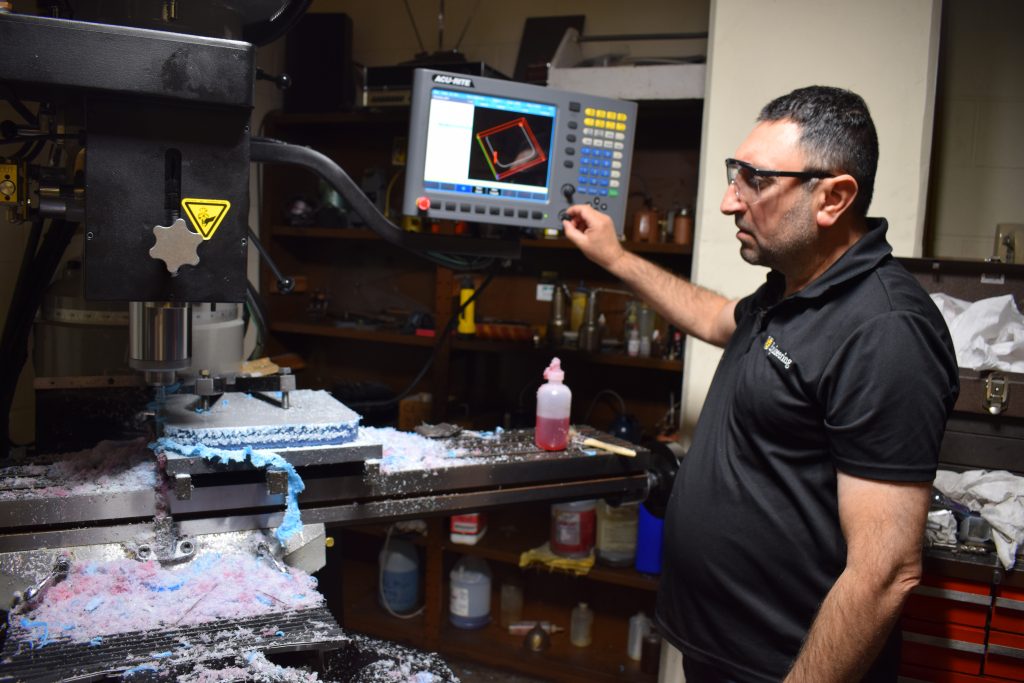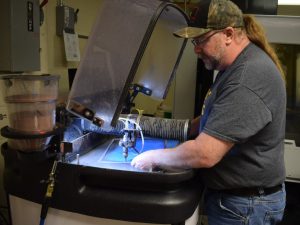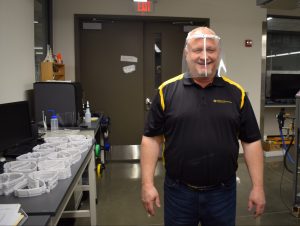May 05, 2020

Research Engineering Technician Ghassan Al Bahhash mills the face shields out of square stock at the College of Engineering.
The MU College of Engineering is working with the Columbia STEM Alliance, Columbia Public Schools, the Columbia Police Department, Boone County and the MU-COVID-19 Task Force to manufacture face shields for first responders and health care workers at no cost. Bill Moore, BS ’77, MS ’85 CiE, the board president of the Columbia STEM Alliance, said a fellow board member contacted him in mid-March with a request from the Harry S. Truman Memorial Veterans’ Hospital for a few face shields because staff was worried about running out of personal protective equipment (PPE).
“We made a few and they liked them and asked for more,” Moore said. “MU found out about the project through the COVID-19 Task Force, and within a week and a half we had requests for over 12,000 face shields from various places.” On March 20, Project Face Shield was launched to fill this need.
He said the Columbia STEM Alliance started working with MU to hone the design of the face shields. Professor Johannes Strobel in the College of Education would take samples to MU and provide feedback to Moore’s team. At the same time, Moore says his team began building a supply chain—identifying the key components of a face shield and then purchasing the materials. Other parts of the supply chain started falling into place: Columbia Public Schools Superintendent Peter Stiepleman offered access to equipment and teachers; the state Office of Emergency Management offered to become a clearinghouse for requests from first responders; MU became the clearinghouse for requests from nursing homes; Boone County provided a building for warehousing and distribution; and College of Engineering Director of Facilities Ron Monson and his team offered to manufacture the clear polymer shields.

Engineering Technician Matthew Marciniak water jets the face shields to keep up with the high demand from health care workers and first responders.
“We have built a supply chain consisting of sourcing operations, a virtual factory operated by a network of students, teachers and volunteers, as well as distribution and logistics systems,” Moore said.
Monson says the face shields are manufactured from 4×8-foot sheets of clear polymer.
“The sheets are flat, so we cut them into 12×12 inch squares for the design they gave us, and then we have two different steps,” Monson said. “Ghassan Al Bahhash is milling the face shield out of that square stock and then Matthew Marciniak is water jetting the shields to keep up with the demand.”
He said his team can cut about 26 face shields from each sheet of polymer, and they can manufacture about 350 face shields in a day. Columbia Public Schools personnel stop by the College and pick up 200-300 face shields at a time and then put the holes in the clear polymer to attach the headband. Monson said Michael Absheer, the College’s Rapid Prototyping Lab Supervisor, 3D printed about 100 headbands for face shields distributed to retirement communities.
Moore said the headbands for Project Face Shield are being printed by Columbia Public School students and teachers in their homes. He said a new, more durable version of the face shields went into production May 4, and 500 of those will be provided to the Boone County Sheriff’s Department.

Rapid Prototyping Lab Supervisor Michael Absheer manufactured about 100 face shields for retirement communities.
“Ron and his team initially started cutting these for us into sizes we can use, but then we found they had the capability to shape them, so once they cut it they can shape it,” Moore said. “Ron and his team have been very creative in finding the most efficient way to do this.”
The completed face shields are given to the Office of Emergency Management, which then disperses them as needed. Moore said the team has manufactured about 1,700 face shields to date. He said each face shield costs between seven to eight dollars to manufacture but are being provided free of charge to first responders and health care workers, so the Columbia STEM Alliance is seeking donations to offset the costs. There is a “Donate” button on the organization’s homepage.
“The feedback we’re getting is they work really well and they can be reused,” Moore said.